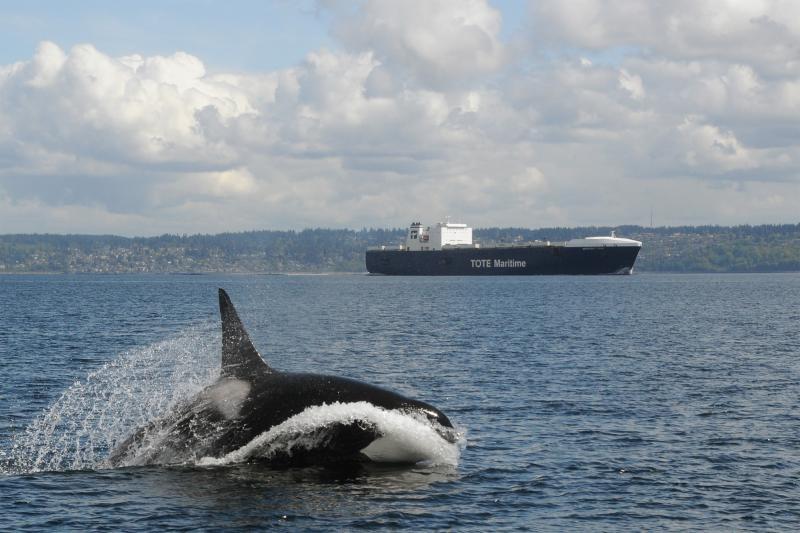
Why can't killer whales find and capture food? The ocean is too noisy
by NOAA Fisheries 15 Sep 2024 15:32 BST

A male orca travels quickly near a large cargo ship transiting through the Salish Sea © Candice Emmons/NOAA Fisheries
New research helps explain how vessel noise reduces foraging efficiency and success in West Coast killer whales.
Southern Resident Connections - Post 37
New research shows that vessel noise—the rumble and churn of boats and ships—disrupts killer whales' ability to find and capture food. This can have serious consequences for these whales, especially considering the challenges they already face. The findings were published recently in the scientific journal, Global Change Biology.
How Killer Whales Hunt and Why Noise Matters
Killer whales are sophisticated hunters. They use echolocation, a kind of biological sonar. They emit clicks that bounce off objects, creating echoes that help them "see" with sound. These echoes they receive back are crucial for finding prey, especially fast-moving salmon. The underwater noise made by vessels can be particularly disruptive for animals like killer whales, which rely heavily on sound to accomplish important activities like hunting.
Researchers wanted to know how vessel noise interferes with killer whales' foraging success. So, they attached special tags to killer whales that recorded their movements and the sounds they made and heard. By comparing these data to noise levels, they could see a clear connection. As the noise from vessels increased, the whales' foraging success decreased. They spent more time searching for prey, but with less success.
Vessel Noise Affects Male and Female Killer Whales Differently
The study also revealed some interesting differences between male and female killer whales. Females, including those with calves, seemed to postpone foraging in noisy areas. This is likely because they cannot afford to waste energy on unsuccessful hunts.
Males, on the other hand, continue searching for prey even in noisy conditions. This is presumably because they cannot afford to postpone since their larger size requires more calories to meet their needs. However, their success rate also decreased significantly.
Auditory Masking: The Primary Culprit Affecting Foraging Efficiency
The culprit behind these problems seems to be a phenomenon called auditory masking. Vessel noise overlaps with the sound frequencies that killer whales use for echolocation and communication. It's like trying to have a conversation in a crowded room—you can barely hear yourself think, let alone what the other person is saying.
While the study focused on the direct impact of noise on hunting success, there may be a domino effect. Noisy oceans could also alter the behavior of the fish species on which killer whales prey. Noise-impacted fish might become more difficult to catch, adding another layer of complexity to the whales' search for food.
These findings highlight the importance of managing soundscapes to protect marine life. By continuing to explore these questions, we can develop a more comprehensive understanding of the challenges faced by killer whales and other marine animals in a noisy world.
The study's researchers were from: